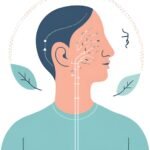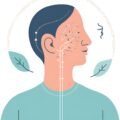Nothing feels quite as refreshing as a midday nap. However, when you wake up, a glance in the mirror often reveals a puffy face and swollen eyes. These are common side effects of napping. But why does this happen? How can we reduce it? Let’s explore the science behind post-nap puffiness, its causes, and effective solutions.
What Happens to Your Face During Sleep?
During sleep, our bodies enter a restorative mode. They handle cellular repair, fluid regulation, and circulation. As a result, lying down can cause fluids to accumulate around the face and eyes. Moreover, the skin around the eyes is thin. Therefore, it’s often the first area to show swelling.
This natural redistribution of fluids explains much of the puffiness we see after naps. Additionally, other factors like sleeping position, hydration, and diet can make the effects more noticeable. Here are some common causes of post-nap puffiness.
Common Causes of Swelling After a Nap
- Fluid Retention
Fluid retention is the main cause of puffiness after sleep. When you lie flat, fluids can collect around your face, especially in areas where the skin is thinner, like the eyes. During the day, gravity pulls fluids downward. However, while sleeping, the fluids redistribute, causing that swollen look.
- Sleeping Position
Your sleep position affects how fluid accumulates. For instance, napping on your stomach or side may worsen puffiness. This is because gravity pulls fluids into areas in contact with your pillow, like your cheeks and eyes. To minimize this, try sleeping on your back with an elevated pillow. This position promotes drainage and prevents fluids from gathering.
- Allergies and Sinus Congestion
If you have allergies, sleeping in a dusty room can cause inflammation around the eyes and face. In fact, allergic reactions increase histamines, which contribute to swelling. Furthermore, sinus congestion from allergies or colds can create pressure around your face and eyes, leading to puffiness.
- Dehydration
Interestingly, dehydration can also cause swelling. When dehydrated, the body holds onto water, leading to bloating and puffiness. Thus, if you wake up with puffy eyes, it might be a sign to hydrate more consistently throughout the day.
- Diet and Lifestyle Choices
Diet significantly impacts fluid retention. For example, foods high in sodium—like salty snacks and processed foods—can increase fluid retention. Moreover, alcohol can contribute to swelling, especially if consumed close to nap time. It dehydrates the body and leads to water retention.
Strategies to Reduce Puffiness After a Nap
The good news is that post-nap puffiness can be managed! Here are some effective methods to reduce swelling and look more refreshed:
- Adjust Your Sleeping Position
If you often wake up puffy, try sleeping on your back with your head elevated. By propping up your head slightly, you can promote better fluid distribution. Feel free to experiment with pillow height for the best results.
- Stay Hydrated
Drink water regularly throughout the day. This keeps your body hydrated and reduces the likelihood of water retention after a nap. As a result, proper hydration supports your circulatory and lymphatic systems, helping to drain fluids.
- Use a Cold Compress
A cold compress can effectively reduce puffiness after a nap. Whether it’s a chilled spoon, cucumber slices, or a cold washcloth, applying cold can constrict blood vessels and reduce swelling. For best results, hold the cold compress over your eyes for a few minutes.
- Give Yourself a Gentle Massage
A facial massage can stimulate circulation and promote lymphatic drainage. To do this, use your fingers to gently tap around your orbital bone, moving from the inner corner of your eyes toward your temples. This technique helps reduce puffiness and improves fluid movement around your face.
- Moderate Your Diet
Eat a diet rich in whole foods and low in sodium. This can help reduce fluid retention, especially before a nap. For instance, choose foods high in potassium—like bananas and leafy greens. Additionally, reducing salty snacks before resting can minimize post-nap swelling.
- Address Allergies and Air Quality
If allergies cause puffiness, keeping allergens away is essential. Therefore, clean and dust your nap area regularly. Consider using an air purifier if you’re sensitive to irritants. Moreover, an antihistamine can help reduce inflammation, but consult a healthcare professional first.
Embracing the Nap with Confidence
Post-nap puffiness can be annoying, but it’s a natural and temporary part of the body’s fluid regulation process. By understanding the science behind it and making a few lifestyle adjustments, you can minimize puffiness and enjoy the benefits of a good nap.
So, the next time you find yourself with a puffy face or swollen eyes after a well-deserved snooze, don’t stress. With hydration, better sleep positioning, and quick tricks like cold compresses and gentle massage, you’ll feel and look refreshed in no time!
































No Comments
Leave a comment Cancel